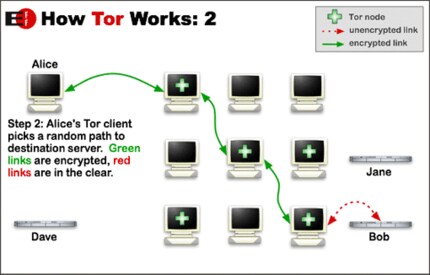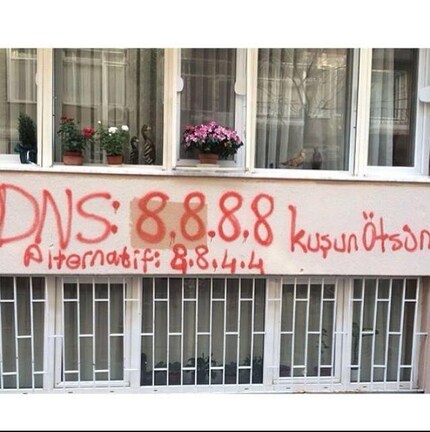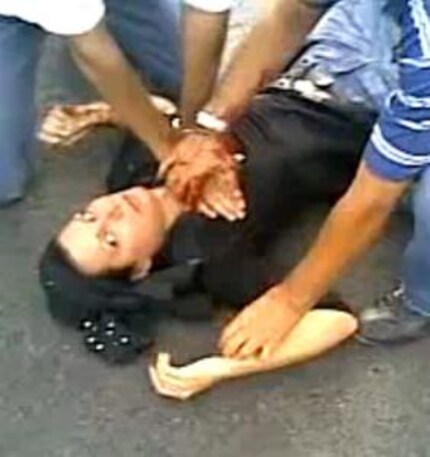
The Darknet: an important instrument for freedom
The Darknet has maintained a steady media presence since a model was reported to have been kidnapped and later released by a Darknet gang. Politicians and media have been discussing a ban. In a conversation at my office, one of my fellow editors also called for the Darknet to be banned – or at least, for its criminal users to be rigorously persecuted. A discourse.
«Darknet» even has an evil sound to it. The urban myths and legends surrounding that part of the internet that doesn’t include Facebook, Reddit and Google leave plenty of room for imagination. Similar to speakeasies during the prohibition era in the 1930s, illegal rave parties or later goa parties during the 1990s and 2000s, only the worst imaginable activities are said to take place in the Darknet. Drug dealing, human trafficking, livestock trade, just to name a few. Apparently. One wrong click is supposed to be enough to wipe out your entire IT infrastructure, publish all your credit card and other personal details and the criminals are already on your doorstep.
In short: The Darknet is a dangerous place full of murderous savages who have it in for you.
That’s just not possible. When Napster and Bittorrent were popular, the same was said about them. If all those stories had been true, we’d all have burst into flames by now. At the very least. But we’re still very much alive and kicking. As is the western world – despite all the predictions that the end is nigh. The Middle East is still around and so are Asia, South America and the rest of the world. We survived Napster. Bittorrent didn’t cause the downfall of democracy. You see what I’m getting at.
My guess: The Darknet isn’t going to kill us either. Nor kidnap us.
As a matter of fact, I’m convinced the Darknet is necessary. Banning it or prosecuting its users without just cause would be against the concept of democracy as such and would create an immediate and concrete danger to life.
What is the Darknet?
The Darknet as technological construct is easy to describe: all parts of the Internet that cannot be indexed, found and published by search engines such as Google, Bing, Yahoo and so forth.
According to this definition, your email inbox kind of belongs to the Darknet. Your internal company network? Darknet. Your Facebook feed? Also Darknet.
The term «Darknet» was coined in the 1970s to designate networks that were isolated from ARPANET (which evolved into the Internet). A lot has happened since then and today, the Darknet is a more or less independent overlay network dedicated to anonymity. An overlay network is a computer network that’s built on top of another network technology – in the case of the Darknet, on top of the Internet as we know it. Nowadays, there are overlay networks for a variety of purposes. They’re highly convenient, as the network functions can be steered accurately and unwanted functions deactivated as early as when defining the network standards.
The Tor network: the Darknet in the media
Whenever the Darknet is discussed in the media, what’s really meant isn’t your private Facebook feed or email inbox, but the Tor network. This is a rather clever invention of The Tor Project, Inc, a non-profit organisation based in Massachusetts.
The Tor Project is mainly responsible for developing and maintaining the Tor Browser, an overlay network made up of what are called «nodes». When connecting to a page, no matter who’s doing so, where they are and what the page is, the Tor Browser will find a random way via Tor nodes. This entire path is encrypted – with one exception, which is the last step that gets you from the Tor Exit Node to the final destination.

Illustration of a Tor connection. Image source: torproject.org/eff.org
Tor nodes never know more about the data’s path than the node it came from and the next one it’s going to. No node ever knows the entire path. Every connection between two nodes is encrypted specially and individually, making it extremely difficult, if not impossible to backtrace.
The Tor Project offers further resources to maintain online anonymity:
- Tails: a fully functional operating system that saves absolutely no user data
- Orbot: essentially Tor for Android users
- Arm: a Command Line Tool to monitor the Tor network
- Pluggable Transports: helps you bypass censorship against Tor
- OONI: a global observation network that detects censorship on the Internet
For us who live in Switzerland, the need to remain anonymous on the Internet might be hard to understand, but this might change soon. Anyone who experienced the early stages of the Internet will know what I’m referring to: we never used our real names, but hid behind nicknames, we didn’t reveal where we lived, mistrusted eBay and couldn’t have imagined being part of a social network like Facebook that’s based on real names. Never!
It’s a totally different story today. Nicknames still exist, but they’re hardly ever relevant as a disguise. Forums with posts that read something like «Hi everyone, I’m MetallicaFan1973, but my real name is Thomas» are becoming extinct. Today, we’re quick to publish where we live and share pictures and selfies. No sign of anonymity.
To be fair, here in Switzerland, we really do have nothing to fear apart from the random stalker – statistically, a rare occurrence. We haven’t had any terrorist attacks, our state is kind to us and all political groups can express their opinions. The yearly demonstration on May Day is more of a public festival and although everyone dislikes the Nazis who gather on Rütli Meadow on the Swiss National Day, nobody would even think of persecuting them just for being around. This behaviour is reflected in the way the Swiss use the Internet (so far). Switzerland’s OONI entry shows that there aren’t any blocked websites in Switzerland. We have unconditional access to any kind of information. Switzerland is marked in blue on OONI’s world map: no confirmed censorship cases.
So who are the people using Tor? Criminals and killers?
In Turkey, OONI’s world map tells a different story: Turkey is marked in red and the list of blocked websites is long. Very long in fact.
- porn sites
- sex education sites
- dating sites for homosexuals
- filesharing sites
- streaming sites
- gambling sites
- drug education sites, especially those about cannabis
- GeoCities
- websites expressing opinions contrary to Turkish politics, for example Hizb ut-Tahrir
Turkey has also been known to block social networks, Google and a number of national news portals in the event of a political crisis. This is an attempt of Recep Tayyip Erdogan’s regime to choke off any protest or rioting. If nobody knows about a riot, nobody can join it. If nobody knows that the regime’s henchmen are attacking innocent civilians, nobody can condemn it.

To maintain communication despite the Turkish government’s activities, dissidents spray DNS addresses onto city walls. This graffiti says «Let your bird (Twitter) sing».
There are other examples, for instance the below image of Neda Agha-Soltan who was shot dead during the 2009 Iranian election protests. Her death was captured on video and sparked a huge wave of shock and solidarity across the world. Time Magazine described her death as «probably the most widely witnessed death in human history». Neda Agha-Soltan was 26 years old and her last words were, «I'm burning, I'm burning!».

Despite immediate help, Neda Agha-Soltan died seconds after this picture was taken.
People living in conflict areas, countries with systemic repression and political turmoil, they’re the ones who use or even need Tor. It’s these people the Tor Project is dedicated to helping. The public need to see footage of the death of innocent people, such as Neda Agha-Soltan, who wasn’t even participating in the protests. It’s necessary for Turkish dissidents to be allowed to express their opinion in public and the Darknet is a place where people can organise in an anonymous way, sheltered from the regime. If not for the Darknet, the Arab Spring would never have happened. Footage such as the video below would never have become public and there would have been no chance for protesters to be heard on a global scale.
Ok, but what about all the killers and dealers?
Despite all its advantages and the fact that the Darknet is essential for democracy, it’s undeniable that there’s a lot of illegal activity going on there. Anonymity allows everyone to hide, that’s the definition of the term. Of course, there are criminals in the Darknet.
Ross Ulbricht alias DreadPirateRoberts created and operated the Darknet market Silk Road for many years. Silk Road, which you can imagine as something like eBay, was a platform where illegal drugs, pornography and weapons were sold. Apart from art and clothing.

A screenshot of the platform Silk Road
He might not have taken drugs himself, but Ulbricht was convicted of conspiracy to traffic drugs and weapons and was sentenced to life imprisonment. However, he wasn’t found out via the Darknet, but based on his digital footprint, going back years into his history of communicating with others online. Traditional investigative methods were enough to prove his guilt.
In a conversation at my office, one of my fellow editors stated: «The police need to hunt down and prosecute the murderers and kidnappers! Or even better ban the Darknet entirely!».
Freedom fighters having to share the same technologies with drug dealers and other criminals of the 21st century is just like Antifa activists from Winterthur having to share the same country with Pnos supporters from Berne. For democracy to rise and thrive, it’s crucial that people with opposing moral and ethical opinions can meet on the same level without having to fear persecution. Nonetheless, we can’t give free rein to crime. These two mechanisms appearing together on the Darknet makes it extremely difficult to pursue justice.
Every functioning democracy is based on the presumption of innocence. Someone offering themselves as contract killer online doesn’t automatically mean they ever have or will kill someone. The same applies for cocaine, kidnapping, child pornography and other terrible things: the fact that they’re offered doesn’t prove they actually exist. A common trick on the Darknet is to offer goods, receive payment and never deliver the promised goods. Who’s going to report to the police that the heroin they bought online was never delivered?
Does this mean everything on the Darknet is fake? Of course not. Drug, arms and probably human trafficking exist and are a lucrative trade. Not long ago, German police uncovered «Elysium», a Darknet child pornography website. The platform had more than 87,000 users and was used for the worldwide exchange of child pornography and to make appointments for the sexual abuse of children. The suspected operator of the platform, a 39-year-old German, was arrested. Several suspected users of the site were arrested in Germany and Austria. Again, it seems traditional investigative methods lead to uncover the platform, not the identification of Darknet users.
The lurid headlines about all the bad things that are going on in the Darknet should be considered with some scepticism. Putting any technological interests aside, the comments on this article (in German) about the alleged kidnapping of a British model as well as the journalistic work lead me to think this scepticism is non-existent. The same goes for any technological or socio-political understanding of the free Internet.
People are calling for criminal investigations in the Darknet and for criminals to be punished without emotion and personal bias. But if the police succeed identifying a child abuser on the Darknet by technological means, Erdogan’s regime will be able to pin down freedom fighters using the same method.
Should the Darknet really be banned or surveilled? Or to put it bold and simple: Is arresting 14 paedophiles worth hundreds of thousands of freedom fighters having to live in fear? This is one of the questions we, as a first-world society, need to ask ourselves. How can we protect whom? And who are we putting at risk by doing so?
Ultimately, we’ll have to face the question that’s as old as mankind itself: How much freedom do we want to give up for a sense of security that might only be an illusion anyway?
Journalist. Author. Hacker. A storyteller searching for boundaries, secrets and taboos – putting the world to paper. Not because I can but because I can’t not.
Interesting facts about products, behind-the-scenes looks at manufacturers and deep-dives on interesting people.
Show all